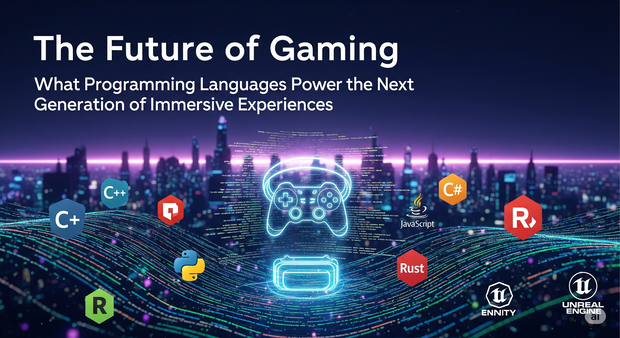
The Future of Gaming: Programming Languages Powering the Next Generation of Immersive Experiences
Introduction
Gaming is evolving at lightning speed. What was once limited to pixelated 2D worlds is now transforming into hyper-realistic, AI-driven, and interactive universes that feel alive. With the rise of cloud gaming, AR/VR experiences, blockchain integration, and AI-powered NPCs, the demand for robust and efficient programming languages is higher than ever. The future of gaming doesn’t just rely on creativity—it thrives on the power of code.
In this blog, we’ll explore the top programming languages shaping the next generation of gaming and why they’re crucial for immersive gameplay.
1. C++ – The Veteran Powerhouse of Gaming
C++ remains a cornerstone in game development due to its high performance and memory efficiency. It powers some of the most popular game engines like Unreal Engine and CryEngine.
-
Why it matters for the future: High-end AAA games demand smooth rendering, real-time physics, and low latency—C++ delivers exactly that.
-
Trending Example: Unreal Engine 5, built on C++, is driving ultra-realistic games with features like Nanite and Lumen.
2. C# – Unity’s Heartbeat
C# is widely used with Unity, one of the most versatile game engines for both 2D and 3D game creation.
-
Why it’s future-proof: Unity is expanding into VR, AR, and metaverse applications, making C# critical for cross-platform development.
-
Trending Example: VR training simulations and mobile AR apps rely heavily on Unity + C#.
3. Python – The AI & Scripting Wizard
Python may not be used for high-performance game loops, but it’s invaluable for prototyping, AI, and automation in gaming.
-
Why it’s gaining importance: AI-driven NPCs, procedural content generation, and player behavior analysis all benefit from Python’s simplicity and vast libraries.
-
Trending Example: Python is used in AI frameworks like TensorFlow for adaptive enemy behavior and recommendation systems in games.
4. Rust – The Rising Star in Game Dev
Rust offers memory safety without sacrificing speed, making it a strong contender for future gaming projects.
-
Why it’s promising: Game dev studios are exploring Rust for VR and multiplayer games due to its stability and performance.
-
Trending Example: Embark Studios has experimented with Rust for server-side multiplayer logic to avoid crashes and lag.
5. JavaScript & WebAssembly – The Browser Gaming Revolution
With the rise of cloud-based and browser games, JavaScript, alongside WebAssembly (Wasm), is redefining what’s possible in online gaming.
-
Why it matters: Gamers can now play high-quality games without downloads, thanks to Wasm’s near-native performance.
-
Trending Example: Web-based versions of complex games like Doom and Unity WebGL builds.
6. Unreal Engine Blueprints – Visual Scripting for Speed
While not a traditional “programming language,” Blueprints in Unreal Engine allow rapid prototyping without deep coding knowledge.
-
Why it’s impactful: Low-code/no-code game development is gaining traction, lowering the barrier to entry for indie developers.
The Future: AI, VR, and Cloud-Driven Languages
The next decade of gaming will be defined by AI integration, virtual reality realism, real-time ray tracing, and cross-platform accessibility. Developers will increasingly blend traditional languages like C++ with emerging tools like Rust and AI-driven scripting in Python to create dynamic, self-learning game worlds.
Cloud gaming platforms (like NVIDIA GeForce NOW and Xbox Cloud Gaming) will also demand languages that can optimize server-side performance, meaning the future isn’t about one language—it’s about a multilingual ecosystem working together.
Conclusion
Programming languages are the silent architects behind every jaw-dropping gaming experience. Whether it’s the raw power of C++, the versatility of C#, or the innovation of Rust, each plays a role in shaping how we play, connect, and immerse ourselves in virtual worlds.
The future of gaming will be built on speed, realism, AI, and player-centric experiences—and the right programming languages will be the foundation of that revolution.






